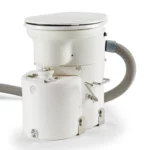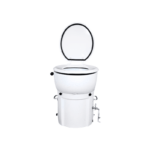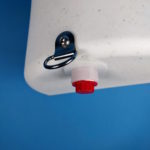Frequently Asked Questions (FAQs)
Are composting toilets, like Air Head, legal?
Yes, both Air Head Classic and Tejo are classified as a MSD type III.
What happens to the smells in the solid tank?
In the Air Head Composting Toilet, once solid matter enters the main tank, foul-smelling anaerobic bacteria die off in a few days due to the presence of air. This creates an environment for non-odorous aerobic bacteria to thrive. This process works best when urine is separated, as in the Air Head, which maintains an optimal carbon/nitrogen ratio for aerobic bacterial action.
Solids are moved under the composting medium and agitated to encourage these aerobic bacteria, which act as a natural odor filter. The result is a minimal, earthy scent, managed by the included external fan and vent. This vent can be installed through external walls or ceilings, and for boats, venting into an anchor locker with external air passage is effective.
Why is urine and feces separation important in composting toilets?
By separating both, It helps to reduce moisture in solid waste, speeding up composting and massively reducing odors. It also helps manage nutrient levels, ensuring a more efficient process. Finally, it reduces the amount of times you will need to empty the solids tank.
How does it make compost?
Once urine and feces are separated, the solid waste is mixed with a carbon-rich material, like our Coco Peat Bricks, which act as a composting medium. This mixture creates the perfect environment for aerobic bacteria to thrive. These bacteria break down the waste into compost, a nutrient-rich soil additive, through a natural, odor-free process.
Is the Air Head suitable for Marine liveaboards?
Absolutely! More and more liveaboards are moving to Air Head Toilets because it allows you to take your boat to areas which are tightly regulated by waste water laws or regular pump outs. A cruising couple can expext to empty the solids tank once per month. It is also much easier to maintain, with fewer moving parts than a traditional manual or electric head would require, meaning you can carry less spares, and spend less time dealing with toilet problems.
Is the Air Head suitable for RVs?
Yes! There is no better option for RVers, either full time, or weekenders. Which is great for boondocking. It opens up so many opportunities to not have to find dump station facilities, or places which sell chemicals. Instead, you are free to roam wherever you want, not planning your route around your toilet!
How often should an Air Head be emptied?
So, the solids tank can take, on average 80 uses. So, if 2 people use the toilet every day, it will last 1 month. But if 2 people are only using it at weekends, it can easily last a full season. Of course it can be emptied more frequently if you are happy to do so.
For liquids it will also depend on usage. But, for 2 people, the small tank will need to be emptied every 1-2 days, and the large tank will last 2-4 days.
Where do you empty the solids?
At Sea: When offshore and/or outside of the legal limits of the United States, the solids can be taken to the edge of the boat and dumped overboard. However, dumping naturally produced matter in US inland lakes and coastal areas is illegal and environmentally unsound due to potential high concentrations of waste, which can lead to elevated algae growth and harm to oxygen-breathing aquatic species. The Air Head Composting Toilet allows cruisers to fill up while at anchor and dump during passages, avoiding contamination of the beautiful, clear tropical waters. The solid tank should hold about a month’s worth of everyday use for a couple.
On Land: For regular use at home, solids from your Air Head should be emptied into a dedicated compost pile or bin, where they will further decompose into usable compost for non-edible plants. When away from home, the solids can be placed in a plastic bag and disposed of in a trash receptacle. For two people using the Air Head Composting Toilet every weekend, the solid tank can be emptied once a season, provided it has sufficient time to dry or break down. After a season’s worth of use, the contents of the solid tank will be dry or slightly moist, with a slight musty smell. It’s best to empty the tank the following spring during commissioning.
Can the fan be turned off for periods?
The fan is designed to provide continuous air flow, aiding in the composting process and helping to minimize odors by evaporating excess moisture. While it’s generally recommended to keep the fan running to ensure the system operates effectively, it can be turned off for short periods if necessary. Extended periods without the fan may hinder the composting process and could lead to increased odors, along with limiting the ability to repel insects
Can the Air Head be ordered in any orientation?
Yes, Air Head Toilets are completely custom. When ordering, you can choose which options suit your install best, allowing you to easily build the toilet around your space.
How much space is needed for a proper installation of an Air Head?
Air Head’s exclusive rounded shape will fit into even the smallest locations. Check out our dimensions page for more detail on sizing to see if it fits your space!
What specific maintenance routines are recommended for long-term use?
We make it as simple as possible. Clean the bowl with vinegar and salt to maintain hygiene. Inspect and clean the fan and vent system for unobstructed airflow, and agitate the composting material to aid decomposition. Check the rubber seals for integrity to prevent leaks and odors. Adjusting the composting medium helps maintain optimal compost moisture. Following these simple routines ensures your toilet remains efficient and hygienic over time.
How does temperature affect the composting process in the Air Head Toilet?
Optimal composting occurs at temperatures between 55°F (13°C) and 100°F (38°C). Within this range, the aerobic bacteria that break down waste are most active, leading to efficient composting and odor control. At lower temperatures, the composting process slows down, as microbial activity decreases. Conversely, if the temperature gets too high, it can kill the beneficial bacteria or lead to excessive moisture loss, hindering the composting process. The Air Head is designed to maintain a balanced environment for composting, but it’s beneficial to be mindful of external temperatures.
What is the recommended procedure for winterizing the Air Head in an RV or boat?
Winterizing the Air Head Composting Toilet in an RV or boat involves a few key steps to ensure it remains functional and odor-free during colder months:
- Empty the Unit: Empty both solids and urine containers before cold weather.
- Clean Thoroughly: Use natural cleaners for a thorough clean of the entire unit.
- Add Antifreeze: If occasionally in use, add non-toxic antifreeze to the urine bottle.
- Maintain Ventilation: Keep the fan and ventilation system running to prevent moisture build-up.
- Insulate Pipes/Vents: Insulate external vents or pipes against freezing.
- Monitor Moisture: Adjust composting medium levels to manage moisture in colder temperatures.
- Use a Heater: In extreme cold temperatures, consider a seedling mat heater under the unit to maintain composting temperatures.
Can I install the Air Head myself?
Absolutely! We have made the install very user friendly for anyone to be able to have up and running in a few hours. Simply follow our installation guide, here: [LINK]
How much power does the 12v Fan use?
The included fant is designed for low power consumption, making it ideal for use in RVs, boats, and off-grid setups. Typically, this fan uses around 0.06 amps per hour. Given its continuous operation, it translates to approximately 1.44 amp-hours over a 24-hour period. This efficient use of power ensures that the fan can run continuously without significantly impacting your battery life, maintaining effective ventilation and odor control with minimal energy usage.
What are the most common troubleshooting tips for first-time users?
For first-time users encountering issues with their Air Head Composting Toilet, here are some essential troubleshooting tips to ensure everything runs smoothly:
- Follow installation guide: Proper fan placement and attention to detail during installation are crucial. Any odors inside your living space often point to a ventilation issue, so double-check that the system is set up correctly.
- Balance the composting medium: Make sure you’re adding the right amount of composting medium. The ideal texture is crumbly and moist but not overly wet, like mud. This balance is key to effective composting and odor control.
- Monitor moisture levels: If you notice strong odors near the exterior vent, it’s a sign that there’s too much moisture in the solids tank. By adding more composting medium, this helps manage moisture levels. Less medium means less evaporation, but be aware that this might also lead to more frequent tank emptying.
Remember, these tips are aimed at optimizing the performance of your composting toilet and minimizing issues related to odors or maintenance. For more detailed guidance, refer to the user manual or reach out for support.
Are there any restrictions on where the composted material can be legally disposed of?
Generally, restrictions will be different depending on location, but typically it is ok to use any compost in flower beds, or in your garden, just don’t use it on anything you plan to eat (fruit or veggies). It is generally permitted to dispose of it in the trash as long as it is in a sealed bag. But you are still advised to consult local authorities to find out if there are any location specific rules to follow.
Can household toilet cleaners be used with the Air Head Composting Toilet?
It’s best to avoid chemical-based household cleaners, like bleach, in your Air Head as they can disrupt the composting process by killing beneficial bacteria. Opt for natural, non-toxic cleaners like vinegar, baking soda, or eco-friendly products designed for composting toilets. These alternatives keep your toilet clean and ensure the composting system works effectively and safely for the environment.
Are there any spare parts recommended for long-term off-grid usage?
In general, there are very few things that can go wrong in your system, which makes maintenance great. However, if you are going away for months or years, we recommend that you carry:
- Fan Replacement: Keeping a spare fan (and electrical wiring) ensures the ventilation system remains operational.
- Spare Lids: In case you drop or misplace a lid for the liquids, order a few extra.
- Composting Medium: While not a “part,” having an extra supply ensures you can maintain the proper composting mix.
Having these items ensures that you can deal with most maintenance or repair needs without a trip to town, keeping your system running smoothly in off-grid situations.
I have a holding/black tank already installed, can I use that for the liquids?
Our brand new model, Tejo, was built with this in mind. It comes without a urine tank, which allows you to install the urine directly to an existing holding tank. This allows you to go much longer without emptying tanks, improving the whole experience.
I have a thru-hull going directly to sea, can I use that for urine?
It’s important to note that U.S. regulations prohibit the discharge of untreated urine into any waterways. However, internationally, this isn’t always the case. (Check your local laws and regulations)
Our brand new model, Tejo, was created to be able to direct urine to an external tank. However, in theory, you could also direct urine directly overboard via an existing thru-hull.
For the installation, we recommend connecting a hose from the Air Head to a Y-valve (diverter valve), with one outlet leading to an internal tank and the other to your thru-hull, incorporating a pump inline to prevent backflow and ensure efficient disposal. This setup reduces the need for frequent emptying, thereby enhancing the usability and convenience of your toilet system.
Again, Always ensure compliance with both local and international maritime laws when configuring your system for waste disposal.
What can I use as a composting medium?
For the composting process in the Air Head toilet, we highly recommend using coir bricks (also known as coco peat) due to their compactness and ease of use. However, a variety of other materials can also serve effectively as a composting medium. These include sphagnum peat moss, non-kiln dried sawdust, coffee grounds, and paper-based pet bedding. While these alternatives can be utilized, it’s important to note that the outcome of using naturally sourced materials can vary, and we cannot guarantee the consistency of the results.
Do you donate toilets?
We welcome all non-profit organizations to approach us with your needs. Particularly, we encourage groups who are building school or housing for those who may find themselves in distress to contact us. Please provide your non-profit Federal Tax ID number and a summary of the work you are doing, including how our product would be of assistance
Do you offer sponserships?
We will not consider unsolicited sponsorship from private parties or private organizations and cannot respond to these types of requests.
Do you offer discounts?
We do our best to be fair and honest about our pricing, which means that the price on the website is generally the only price available. However, we believe that trade shows and festivals encourage community and camaraderie among people with a common interest, and we enjoy showing our support at these gatherings.
When we have an exhibition at such a show, we will often provide a modest discount to those who attend. This discount is intended to help defray the costs of travel and admission and is not a general discount for everyone during this time. In order to obtain a show discount, please provide valid payment information indicating admission into the show.
Occasionally, we feature the “Air Head” in online marketplaces such as “Ebay.” These offers may include a modified configuration at possibly a reduced price. No other discounts should be expected.<










